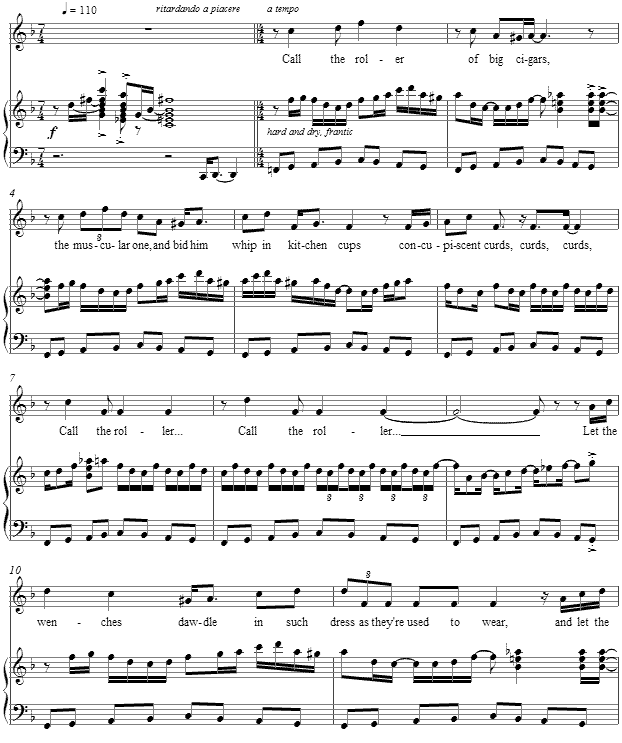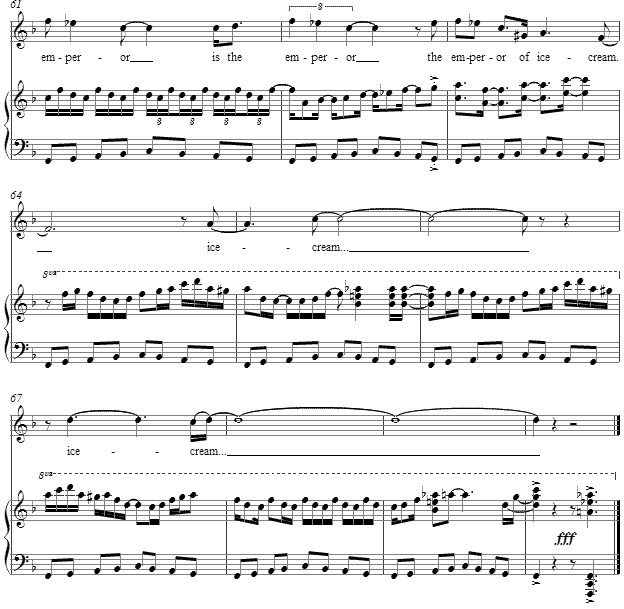Music and Texts of GARY BACHLUND Vocal Music | Piano | Organ | Chamber Music | Orchestral | Articles and Commentary | Poems and Stories | Miscellany | FAQs |
The Emperor of Ice-Cream - (2005)
Wallace Stevens
medium voice and piano
1922
Call the roller of big cigars,
The muscular one, and bid him whip
In kitchen cups concupiscent curds.
Let the wenches dawdle in such dress
As they are used to wear, and let the boys
Bring flowers in last month's newspapers.
Let be be the finale of seem.
The only emperor is the emperor of ice-cream.
Take from the dresser of deal,
Lacking the three glass knobs, that sheet
On which she embroidered fantails once
And spread it so as to cover her face.
If her horny feet protrude, they come
To show how cold she is, and dumb.
Let the lamp affix its beam.
The only emperor is the emperor of ice-cream.[ 6 pages, circa 2' 25" ]
Wallace Stevens
Wallace Stevens (1879-1955) was born in Reading, Pennsylvania, and educated in the classics at Reading Boys' High School, and at Harvard during the years 1897-1900, acting as president of the Harvard Advocate and publishing some verse. After several years as a reporter in New York, Stevens entered New York Law School in 1901 and was admitted to the bar in 1904.In New York he worked for several law firms and then joined an insurance firm, the American Bonding Company of Baltimore, which became the Equitable Surety Company of St. Louis. Stevens married in 1909 and lived in New York until moving to Hartford, Connecticut, in 1916. Until his retirement, he worked for the Hartford Accident and Indemnity Company, moving up to Vice President in 1934, akin to composer Charles Ives, who also worked in insurance while pursuing his craft. Steven's poem "Pecksniffiana" won the Helen Haire Levinson Prize offered by Poetry in 1920.
Stevens wrote, "A poem need not have a meaning and, like most things in nature, often does not have." In Opus Posthumous, "Adagia" (1959). Stevens knew well Key West in Florida, which is probably where this poem takes place, since ice-cream was commonly served at funerals during the hot weather. It is said the poem speaks of the duality of eros and thanatos, of life and death.
The images are of the physical, the ripe and the remembered, vital and visceral. For that I chose an extremely simple measure-long and unchanging bass line, too basic to be called a ground bass but reflecting the ubiquity of death in every life. Over it the upper voice of the accompaniment plays a forced "happy" counterpoint, almost frantic or frenetic.

The simple left hand rising and falling in one measure long phrases represents the consistent flow of life and death, and so is uninterrupted from beginning to end of this setting. The right hand's frenetic counterpoint is, as in the poem's images, a counterpoint to the grave realization of death surrounding life.

So as with the ice cream served amid the solemnity of a funeral, the setting ends with a call for that very "ice-cream."
The score is available as a free PDF download, though any major commercial performance or recording of the work is prohibited without prior arrangement with the composer. Click on the graphic below for this piano-vocal score.
